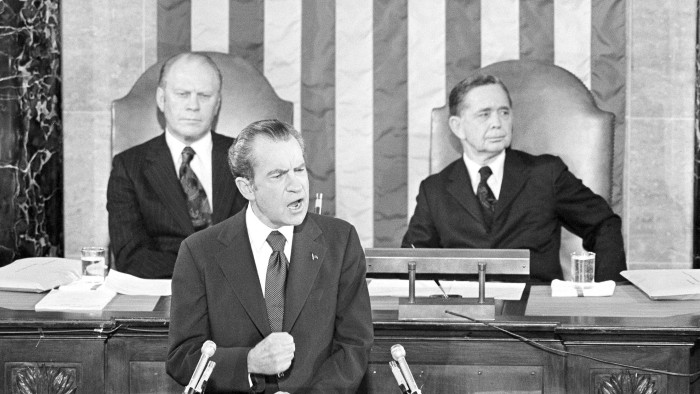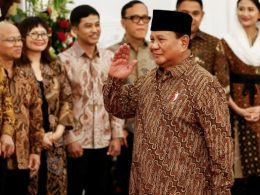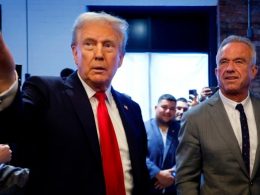Today’s the day. It’s cold outside in Washington DC. It might be colder everywhere once the warm embrace of an at least vaguely rule-bound world trading system has lost its grip entirely, but let’s see. Recently I found someone who shares my measured optimism on that front in the form of the actual “Tariff Man”, Dartmouth College trade professor Doug Irwin, author of the definitive history of US trade. I talked with Doug for an episode of the FT’s Economics Show podcast, normally hosted by the great Soumaya Keynes, which was posted here this morning. (There’s been a technical difficulty, so try another podcast player if the first doesn’t work.) A transcript is here.
In today’s extended-length newsletter, I’m looking at Doug’s historical comparison and how other governments are already handling or mishandling Trump. Charted Waters is on liquefied natural gas sales.
Buckle up, everyone. The next four years will be a bumpy ride. Take a deep breath. Stay with me. For anything you want to share, or if you want to just cry for help, I’m at alan.beattie@ft.com.
Get in touch. Email me at alan.beattie@ft.com
Tricky Dick and Dubious Don
Displaying a somewhat improbable interest in the intellectual history of taxes on imports, Donald Trump has several times cited the 19th century as an inspiration. Specifically, he’s a fan of William McKinley, president from 1897 to 1901. To free-traders, the McKinley tariff of 1890, whose eponymous promoter was then in Congress, is almost as notorious as the Smoot-Hawley one — though Smoot-Hawley kicked off a global surge in protectionism while the McKinley tariff came at a time of enormous industrial expansion.
This 1894 cartoon from Harper’s magazine (taken from here) shows US industrialists lining up for protection the country didn’t really need and shouldn’t have imposed.

If Trump is a new McKinley, we’re in for some really quite serious long-term protectionism and a reordering of the US economy. This is unlikely to make the US better off: Doug has shown that the US became an economic great power in the late 19th century despite, rather than because of, high tariffs. (The McKinley tariff in particular was a really bad idea, and also exceedingly politically unpopular.)
But Doug notes moments in the past that shaped up to be turning points and then were not. One was in the early years of Ronald Reagan’s administration — when aggressive protection against Japanese cars and steel seemed to be overturning the postwar era of open trade — in which tariffs were reduced by successive multilateral rounds of talks under the General Agreement on Tariffs and Trade. (Chart from here.)

In the event, the protectionism was selective: Reagan pushed forward the development of the international system through the Uruguay Round of trade talks that ultimately helped to create the World Trade Organization.
You could argue that the first Trump administration threatened a lot more upheaval in world trade than it actually delivered. The renegotiation of Nafta didn’t make much difference and a bunch of tariffs against Chinese imports were much less destructive than they appeared, partly because they were circumvented by flexible supply chains.
Doug reckons this makes Trump more like Richard Nixon (similarly irascible with questionable ethics, though that’s my observation rather than Doug’s). Nixon saw trade in competitive terms and wasn’t a big fan of being constrained by international rules. He mixed foreign policy with trade, such as the deal that combined textile import restrictions with returning the US Okinawa military base to Japan. In 1971, Nixon dealt the final blow to the postwar Bretton Woods fixed exchange rate system and slammed on a 10 per cent across-the-board “surcharge” to force other countries to revalue their currencies against the dollar.
As it happens, if Trump undertakes similar unilateral action, he will be very likely to use the International Economic Emergency Powers Act, a law that grew out of the Trading with the Enemy Act employed by Nixon.
Their styles are also similar. Nixon ran a rambunctious administration with abrasive advisers and enjoyed unsettling other governments to force them into concessions. His Treasury secretary John Connally had two notorious maxims: one, that “all foreigners are out to screw us and it’s our job to screw them first”, and two, that the dollar was “our currency but your problem”.
Yet in the end, what happened? Sure, the world moved to a less ordered place with floating exchange rates and had a rocky, inflationary decade, but still global trade expanded. The Tokyo Round of multilateral trade talks was launched in 1973 during Nixon’s time in office and concluded by 1979. Hoping trade policy in Trump’s second term turns out to be as benign as Nixon’s isn’t quite what I expected, and yet here we are. Do listen to the podcast.
Dealing with Trump: paying the Danegeld
Rudyard Kipling foresaw all the issues about dealing with Trump. Though in the context of Greenland, the Danish boot is now on the other foot. See how you like it, Denmark.
Denmark’s government might have been forgiven for thinking Trump’s Greenland obsession would blow over in a couple of days. That, after all, is what happened in 2019 during his first term. It was mistaken. Danish Prime Minister Mette Frederiksen had the pleasure of a long call from Trump on Wednesday pressing his case to buy the territory.
(As it happens, US rivalry with China over Greenland and its natural resources is the subject of the fourth series of the excellent Danish political drama Borgen.)
Who can tell, since nobody knows anything, but the Danish response so far, at least in public, has probably been the right one: don’t pay the Danegeld by ceding fundamental and irreversible influence over Greenland to the US, reiterate your commitment to the security actions you were doing anyway, wait to see what Trump actually does in office, hope the EU is ready for trade retaliation if necessary and talk to your exporters about how they might cope with tariffs. There’s no doubt that companies such as Novo Nordisk would be hurt by the US market closing, but it still produces world-beating drugs, so it’s hard to imagine that tariffs would devastate the Danish economy in the long term.
Of course, the best way to help exporters is to find them new markets. That is why the EU and Mexico signing an update to their preferential trade agreement (PTA) on the last working day before inauguration was excellent timing, as is the EU and Malaysia restarting talks on a PTA today. For Mexico, a country on the frontline of Trump’s trade coercion, this underlines that its exporters have other options to the US. Similarly, as I’ve said before, whether or not the EU-Mercosur deal gets ratified in the European Council of member states and the European parliament is a pretty good test of whether the EU in general and France in particular are serious about the geopolitical role they’re always blathering on about.
The UK shows how not to do it
Meanwhile, a close US ally has been showing how not to manage the relationship. You can believe or not the very thinly sourced report that the Trump camp dislikes the UK’s designated ambassador Lord Peter Mandelson so much that they might reject him — though at least one Trump operative has already fiercely criticised him for his past criticism of the new president.
But in any case, Mandelson’s nomination underlines the inexperience and insularity of Sir Keir Starmer’s Labour government. Star status in the small pond of Westminster doesn’t automatically translate to competence in the complex world of international diplomacy.
One big factor in Mandelson’s selection was apparently experience in trade negotiations, thanks to his time as EU trade commissioner from 2004 to 2008. But Mandelson wasn’t a good commissioner, as noted by many at the time. He repeatedly irritated counterparts, and US Congress types were privately scathing about him to me, not least because of his freelance commentaries on US politics. Fun for journalists to cover, yes; an effective diplomat, no.
Indeed, the Labour government simply seems not very good at trade strategy in general. Recently it’s been citing talks about PTAs with the US and India as a reason for not concentrating on what should obviously be the main event: getting closer to the EU. A good US deal in particular is very improbable, since Trump isn’t much into formal PTAs and it won’t mean much to the UK economy if it does happen. (The UK exports mainly services, for which the US doesn’t really grant market access in PTAs, and certainly not for finance.) Meanwhile, going on about it makes the UK look like a wheedling supplicant. Starmer’s manoeuvrings are now antagonising both the EU and the US. I’d expected better.
Charted waters
Last time Trump was in the White House, the European Commission bamboozled him by promising to buy more LNG despite having no capacity whatsoever to do so. As it happens, the Russian invasion of Ukraine means they’re doing it for real, but still not enough for Trump’s liking.

Trade links
-
The FT’s Unhedged newsletter heroically searches for rhyme or reason in Trump’s trade and economics team. I’d only add that some members are out-and-out currency and trade warriors spoiling for a fight, having what Shakespeare calls the “stain of soldier” (All’s Well That Ends Well, since you ask) about them, and others are not. But ultimately they’ll all have to accommodate Trump’s whims or get thrown aside.
-
My FT colleague Tej Parikh in the Free Lunch newsletter examines how China can soften the blow of US tariffs without having to get involved in a retaliatory spiral. To stay with the early modern literary theme, 17th-century writer George Herbert correctly observed that “living well is the best revenge”.
-
The suspension and un-suspension of TikTok, on which Trump has done a total U-turn from his previous intention of shutting it down, is providing an early test of his attitudes to tech and China.
-
Trump’s trade policy may not resemble William McKinley’s, but University of Chicago associate professor Paul Poast argues that his foreign policy does hark back to the 19th century. This comparison was also made in a highly prescient piece by Thomas Wright of the Brookings Institution before the 2016 election.
-
If you’re an FT subscriber and you want to hear me as well as read me, I’m joining a panel of FT and external luminaries to talk about Trump’s second term this Thursday at 1pm GMT.
Trade Secrets is edited by Harvey Nriapia
Source link









